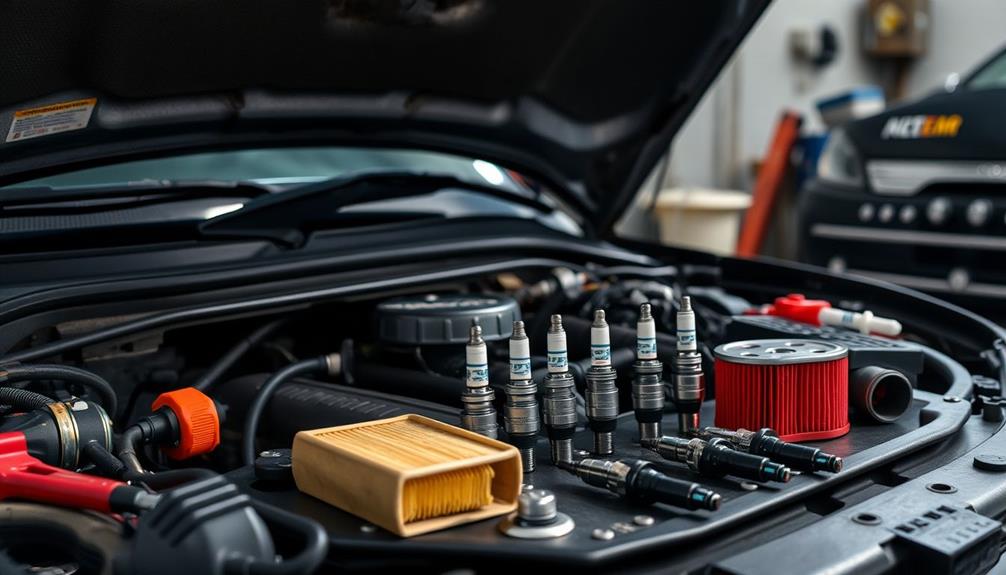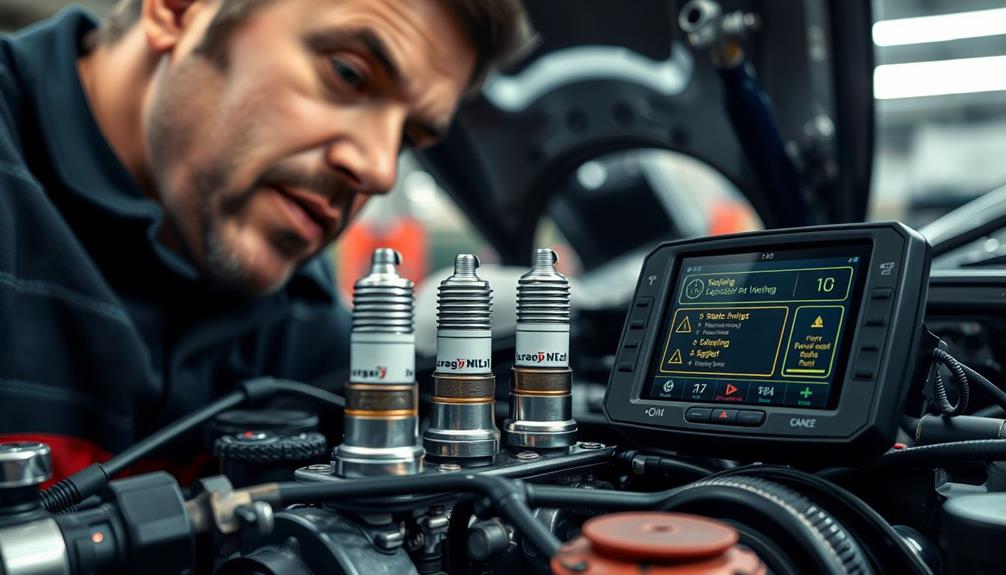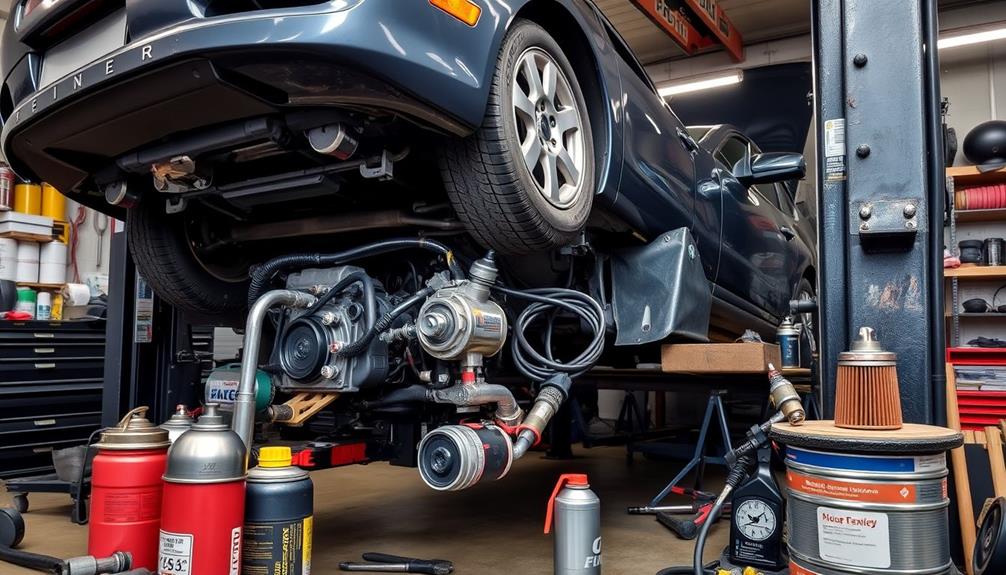Car tune-ups are essential for keeping your vehicle running at its best. They involve routine maintenance checks every 6 months or 5,000 miles, focusing on components like spark plugs, air filters, and oil changes. By following your manufacturer's guidelines, you can improve fuel efficiency, enhance performance, and catch small issues before they become costly repairs. Signs that you need a tune-up include a drop in fuel mileage or rough idling. The costs usually range from $40 to $150, depending on services needed. Interested in how to choose the right repair shop or understand the specifics of tune-up services?
Key Takeaways
- Car tune-ups involve preventive maintenance services aimed at enhancing engine performance and longevity, typically recommended every 6 months or 5,000 miles.
- Key components of a tune-up include replacing spark plugs, air filters, fuel filters, and performing oil changes and battery testing.
- Signs that indicate a need for a tune-up are decreased performance, activation of the check engine light, and a drop in fuel mileage.
- Regular tune-ups can improve fuel efficiency by 4-12%, enhance vehicle performance, and reduce the likelihood of costly repairs.
- Choosing a qualified repair shop with certified technicians and obtaining written estimates ensures transparency and adherence to maintenance guidelines.
Definition of Car Tune-Ups
Understanding car tune-ups is essential for keeping your vehicle running smoothly. A car tune-up is a suite of preventive maintenance services aimed at guaranteeing peak engine performance and longevity. Typically, these services are recommended at specific mileage intervals, allowing you to stay ahead of potential issues. One important aspect of a car tune-up is checking and replacing spark plugs, filters, and fluids, as well as inspecting and adjusting ignition timing and idle speed. These tasks are commonly included in a comprehensive car maintenance checklist and are vital for ensuring your vehicle operates at its best. By staying proactive with regular tune-ups and following a car maintenance checklist, you can extend the life of your car and avoid costly repairs down the road.
During a tune-up, you'll have critical components inspected and replaced, such as spark plugs and wires, air filters, and fuel filters. This not only prevents breakdowns but also helps avoid costly repairs down the line.
Regular tune-ups can greatly boost your vehicle's fuel economy, possibly improving it by 4-12%, depending on its condition.
It's important to follow your manufacturer's recommended maintenance schedules for these tune-up services. Each vehicle has different needs, and newer models often require computer diagnostics to make sure everything is adjusted correctly.
Key Components of Tune-Ups

A thorough car tune-up includes several key components that play an essential role in maintaining your vehicle's performance.
First, replacing spark plugs is necessary, as they should be changed every 30,000 to 40,000 miles to guarantee optimal ignition performance.
Next, don't forget the air filter and fuel filter; both should be replaced regularly to assure clean airflow and optimal fuel delivery.
During your tune-up, you might also have the throttle body inspected and cleaned, which can enhance engine efficiency greatly.
An oil change is another critical aspect of routine maintenance, along with replacing the oil filter, to keep your engine healthy and prevent wear over time.
Additionally, checking the ignition wires and the PCV valve is important for maintaining the overall functionality and longevity of your engine.
These components work together to make sure that your vehicle runs smoothly and efficiently.
Maintenance Schedules and Intervals

To keep your car running smoothly, it's essential to follow recommended mileage intervals for maintenance.
Seasonal changes can also affect when you should schedule services, so don't overlook those factors.
Always refer to your owner's manual for specific guidelines tailored to your vehicle's needs.
Recommended Mileage Intervals
While you might be tempted to neglect maintenance, sticking to recommended mileage intervals for tune-ups can greatly enhance your vehicle's performance and longevity.
Keeping track of these intervals guarantees your car runs smoothly, preventing costly repairs down the line. Here's what you should know:
- Regular Tune-Ups: Aim for a tune-up every 6 months or 5,000 miles to keep your engine components in peak condition.
- Spark Plugs Replacement: Replace spark plugs every 30,000 to 40,000 miles to maintain efficient ignition and engine performance.
- Engine Coolant Change: Change your engine coolant every 2-3 years to avoid overheating and to promote engine health.
- Timing Belts Replacement: Timing belts should be replaced between 80,000 and 100,000 miles to prevent severe engine damage from a broken belt.
Additionally, if you use synthetic oil, you can extend oil filter changes to 7,500 to 15,000 miles, depending on your manufacturer's specifications.
Keeping these intervals in mind can lead to a more reliable and efficient vehicle, guaranteeing your car remains a trustworthy companion on the road.
Seasonal Maintenance Considerations
Maintaining your vehicle's performance year-round means paying attention to seasonal maintenance needs. Following the guidelines in your owner's manual can help you keep everything running smoothly.
Regular tune-ups every six months or 5,000 miles are key, as they include essential services like checking spark plugs and wires/coil, changing oil, and inspecting wear-and-tear parts. Seasonal changes can impact your vehicle's performance, making it vital to check belts, hoses, and battery health before extreme weather hits.
You should also monitor your fuel system closely. A 10% decrease in miles per gallon may signal that a tune-up is needed to prevent issues like engine misfires.
Additionally, make sure coolant is flowing properly through the engine, and keep an eye on the transmission fluid. You mightn't need to change it annually, but your driving conditions can dictate how often it should be serviced.
Manufacturer Guidelines Importance
Understanding manufacturer guidelines is essential for keeping your vehicle in top shape. By following these recommendations, you can enhance engine performance and prevent costly repairs.
Here's why adhering to maintenance schedules is important:
- Tune-up Intervals: Most manufacturers suggest tune-up intervals every 6 months or 5,000 miles, ensuring your car runs smoothly.
- Spark Plugs: Replacing spark plugs every 30,000 to 40,000 miles is critical for maintaining optimal engine performance and efficiency.
- Fluid Changes: Regular fluid changes, including engine oil and transmission fluid, are essential. Many manufacturers recommend these changes annually or based on mileage.
- Routine Maintenance: Following manufacturer guidelines helps catch minor issues before they escalate, greatly extending your vehicle's lifespan.
Benefits of Regular Tune-Ups

Regular tune-ups offer significant advantages for your vehicle, guaranteeing it runs smoothly and efficiently. By replacing spark plugs and performing essential service on your engine, you can improve fuel efficiency by 4-12%. This means you save on fuel costs over time, which is always a win.
Routine maintenance during these tune-ups helps prevent minor issues from escalating into major repairs, ultimately saving you from costly fixes.
Moreover, enhanced vehicle safety is a vital benefit. Thorough inspections during tune-ups guarantee that critical components like brakes and lights are functioning properly, keeping you and your passengers safe on the road.
Another perk of regular tune-ups is the increased resale value of your vehicle. A well-maintained car is much more attractive to potential buyers, as they can trust its reliability and performance.
Lastly, proactive care during tune-ups extends the lifespan of your vehicle's components, leading to a more dependable driving experience.
Identifying the Need for a Tune-Up

You might notice your car isn't running as smoothly as it used to, and that could be a sign it's time for a tune-up. Identifying the need for a tune-up is vital for maintaining your vehicle's performance. Here are some indicators to watch for:
- Check Engine Light: If this light comes on, it often signals potential engine issues that need your attention.
- Decreased Vehicle Performance: Rough idling, stalling, or general sluggishness may indicate that your ignition system or fuel components are in need of service.
- Knocking Noises: If you hear knocking sounds from the engine, it could signal serious mechanical problems that require immediate inspection.
- Drop in Fuel Mileage: An observed decrease of 10% or more in fuel efficiency often reflects engine inefficiencies that a tune-up can help restore.
For older vehicles, routine inspections of spark plug wires and filter replacements are essential.
Addressing these issues promptly can prevent significant performance deterioration and keep your car running efficiently.
If you notice any of these signs, don't hesitate to schedule a tune-up!
Choosing the Right Repair Shop

Once you've identified that your car needs a tune-up, the next step is finding the right repair shop to handle the service. Start by researching local shops and checking their reputations online. Focus on customer reviews and ratings to gauge quality and reliability.
Look for shops that employ ASE-certified mechanics, as this certification indicates a higher level of expertise in car maintenance.
When you contact potential repair shops, ask for written estimates. This helps you compare prices and services, ensuring transparency and avoiding unexpected costs.
Make sure the shop you choose specializes in your vehicle's make and model; specialized knowledge can lead to more accurate diagnostics and repairs.
It's important to verify that the shop follows manufacturers' recommended guidelines. For instance, they should know when to change your cabin air filter or other components that need to be replaced as often as necessary.
Additionally, check if they offer warranties on parts and labor. This can provide peace of mind, protecting you from future repair costs.
With the right shop, your tune-up can be a smooth and effective process, helping keep your vehicle in top shape.
Frequently Asked Questions
What Does a Car Tune-Up Include?
A car tune-up includes replacing spark plugs, inspecting filters, changing oil and oil filters, checking belts and hoses, and possibly adjusting ignition timing. This helps maintain your engine's efficiency and longevity for a smoother ride.
What Is the Average Cost of a Full Tune-Up?
Think of a tune-up as a spa day for your car. On average, you'll spend between $200 and $800 for a full tune-up, depending on your vehicle's needs and the services included.
Does Transmission Fluid Get Changed During a Tune-Up?
Transmission fluid isn't typically changed during a standard tune-up. Instead, it's usually inspected. You should check your owner's manual for specific recommendations on when to change it, as neglecting this could lead to costly repairs.
How Do You Know When You Need a Full Tune-Up?
You'll know you need a full tune-up if your check engine light's on, performance drops, you hear knocking noises, fuel mileage decreases considerably, or you've hit the recommended spark plug replacement interval. Pay attention!
Conclusion
In summary, car tune-ups are essential for keeping your vehicle running smoothly and safely. By staying savvy about schedules and spotting signs of trouble, you guarantee your car's performance doesn't plummet. Regular maintenance not only prolongs vehicle life but also promotes peace of mind. So, don't delay! Diligently engage in your auto care routine, and you'll drive with confidence and comfort for countless journeys ahead. Tune-ups truly transform your driving experience!










